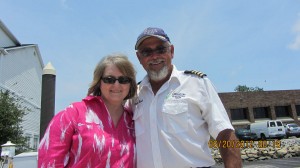I’m back from a combination research trip/vacation to the South Carolina Lowcountry, the setting for my 2013 novel to be published at Thomas Nelson Fiction. I had a great week in a place I have come to love over the past 15 years of visiting there. Met some wonderful people and learned some new things, even after having been there so many times. Over the next few weeks, I’ll share some of the highlights with you.
 Beginning with my day exploring the old rice plantations on the Pee Dee and Waccamaw Rivers: Ron and I spent an entire morning with Captain Rod Singleton, a native of the Georgetown area who shared a wealth of information about the history of Georgetown, once the second richest region in the country. Because Cap’n Rod’s tour boat is too large to navigate the inlets and parts of the Pee Dee, we headed out in his small motorboat, just the three of us. After a brief lecture on the history of Georgetown, Cap’n Rod gunned the big Yamaha engine and we headed up the Sampit River to the Pee Dee. I was particularly interested in the plantations once owned by the family of Elizabeth Waites Allston Pringle whose father was once the governor of South Carolina. After his death, Mrs. Pringle ( wife of John Julius Pringle) returned to the family’s plantation, Chicora Wood where she grew rice until the 1920’s. On the way, we passed other Allston family plantations including Nightingale Hall, which lies seven miles from Chicora Wood. Cap’n Rod told me that back in the day, it took 2 and a half hours by boat “on the falling tide” and then another 45 minutes by horse and buggy to travel between the two properties, a trip that Mrs. Pringle made every day.
Beginning with my day exploring the old rice plantations on the Pee Dee and Waccamaw Rivers: Ron and I spent an entire morning with Captain Rod Singleton, a native of the Georgetown area who shared a wealth of information about the history of Georgetown, once the second richest region in the country. Because Cap’n Rod’s tour boat is too large to navigate the inlets and parts of the Pee Dee, we headed out in his small motorboat, just the three of us. After a brief lecture on the history of Georgetown, Cap’n Rod gunned the big Yamaha engine and we headed up the Sampit River to the Pee Dee. I was particularly interested in the plantations once owned by the family of Elizabeth Waites Allston Pringle whose father was once the governor of South Carolina. After his death, Mrs. Pringle ( wife of John Julius Pringle) returned to the family’s plantation, Chicora Wood where she grew rice until the 1920’s. On the way, we passed other Allston family plantations including Nightingale Hall, which lies seven miles from Chicora Wood. Cap’n Rod told me that back in the day, it took 2 and a half hours by boat “on the falling tide” and then another 45 minutes by horse and buggy to travel between the two properties, a trip that Mrs. Pringle made every day.
Our adventure took us into a very narrow cut where we saw an alligator’s nest. On either side, the marsh grasses grew so tall that the captain said he had once sheltered from a storm there and hardly got wet. Back out into the broad, blue Waccamaw River,(much wider and much more beautiful than I had imagined) we saw ospreys perched in the trees, a 200 pound bald eagle’s nest so strong it survived Hurricane Hugo back in the 1980’s, and several other plantations including Weymouth, Dirlington, Arundel, and Caledonia, the latter now a very exclusive golfing community. But it was Chicora Wood that brought tears to my eyes, and made Elizabeth come alive for me. I will never forget my first sight of it as the boat approached. I would have loved seeing the interior, but the current owners live in California and so far have not opened up the house for visitors.
Back in Georgetown, Captain Rod showed us the Strand Theater where the kissing scene from the movie “The Notebook” was filmed. We walked past the old Slave Market, the Rice Museum and the town’s beautiful clock tower that dates from the mid 1800’s, and then to a cafe for a real “locals” lunch of shrimp and grits, fried green tomatoes and plenty of iced tea, the house wine of the South.
As soon as I have time, I’ll post more pictures in my Album here on the site, but for now, here’s a picture of me with Captain Singleton, a true Lowcountry treasure.

What a great visit you had! I have family all over this area. In fact, my family background is all over the South Carolina area, but primarily the Low Country. I, too, have been thinking of writing a novel set in this area, in a different time period. I hope you do well with yours. This is my favorite part of the world. Unfortunately, my family (mom and dad) moved away from there when I was but 2 years old, and I have lived in South Florida since then. I have spent many vacations going up there, visiting family, and having a good time. I’m so delighted that you have come to love this area and its people.
Hi Harriet,
Thanks for stopping in and for the good wishes on the lowcountry novel. SC my favorite part of the world, too. Best of luck with your novel!